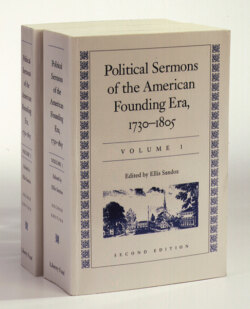Читать книгу Political Sermons of the American Founding Era: 1730–1805 - Группа авторов - Страница 53
На сайте Литреса книга снята с продажи.
ОглавлениеISAAC BACKUS (1724–1806). Born in the village of Yantic in Norwich township, Connecticut, Backus converted to Christianity in 1741 as a result of the Great Awakening preaching of the theologian Eleazar Wheelock. For the decade prior to 1756, when he settled in Middleborough, Massachusetts, Backus was a separatist Congregationalist. From 1756, he was pastor of the Middleborough First Baptist Church until his death. He is ranked with Roger Williams, John Leland, Thomas Jefferson, and James Madison as a preeminent figure in the establishing of freedom of conscience in America. In William G. McLoughlin’s words, Backus “was the most forceful and effective writer America produced on behalf of the pietistic or evangelical theory of separation of church and state” (Isaac Backus on Church, State, and Calvinism: Pamphlets, 1754–1789 [Cambridge, Mass., 1968], p. 1). Intellectually, the chief attainment of Backus was his idea that “religion is ever a matter between God and individuals” (as he stated in 1783). Institutionally, his major accomplishment was the cultivation of the role of the Baptist church, and the religious sphere generally, as outside the jurisdiction of civil magistracy. As an evangelist–statesman, Backus preached the gospel far and wide; he calculated that during the period 1748 to 1802 he had made 918 trips longer than ten miles each and traveled a total of 68,600 miles, mostly on horseback.
Backus was a trustee of Brown University from 1765 to 1799. He served as an “agent” for the Warren Association from 1771 onward, looking after all Baptist interests, somewhat like a modern lobbyist. In that capacity, he conferred with the delegates to the First Continental Congress in 1774 in Philadelphia, upholding religious liberty, for Baptists in his day had suffered imprisonment for their views and practices. A supporter of the Revolution, he afterwards continued his battle for liberty of conscience in the states of the new Union. He served as a delegate from Middleborough to the Massachusetts convention that ratified the federal Constitution in 1788. He rejoiced in the coming of the Second Awakening to the Kentucky and Tennessee frontier in the early 1800s, having participated personally in camp meetings a decade earlier in North Carolina and Virginia. He renewed his efforts in the last years of his life to stir the embers of religious revival in New England.
